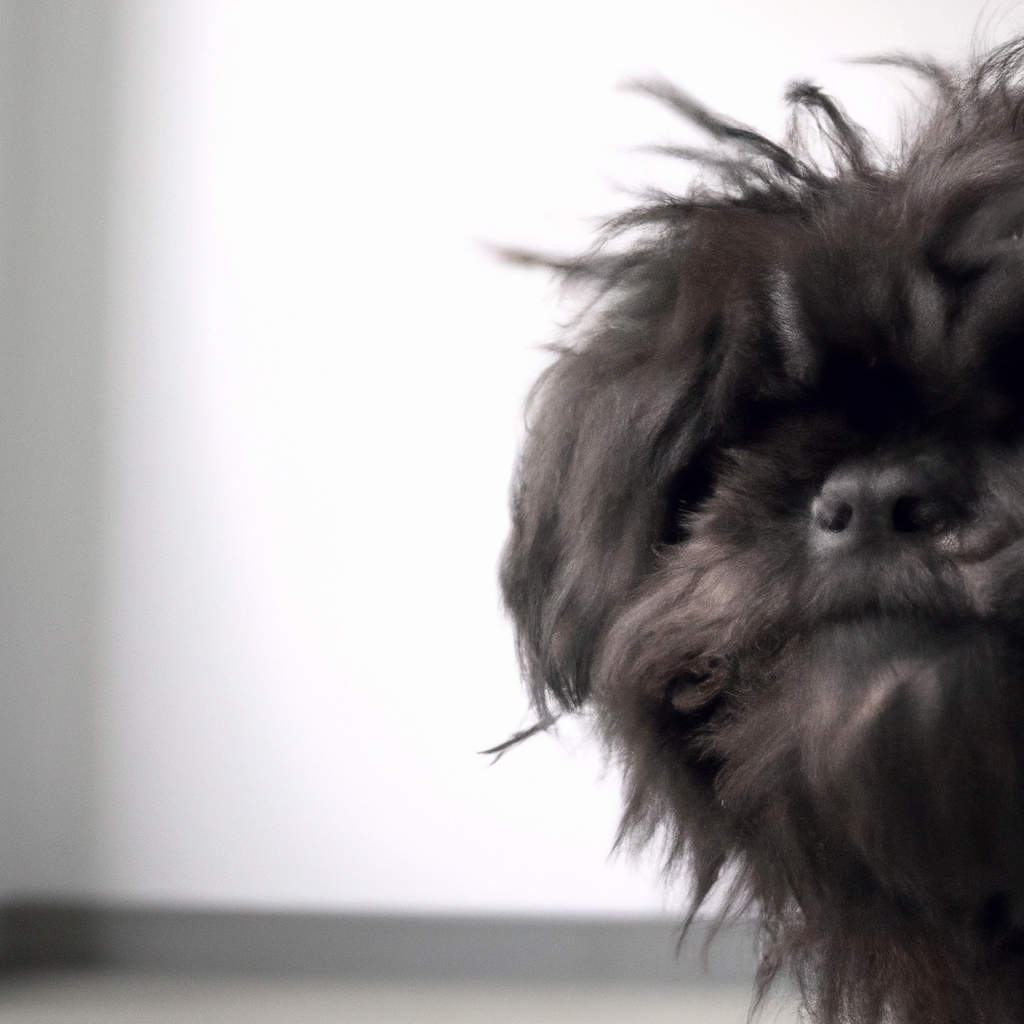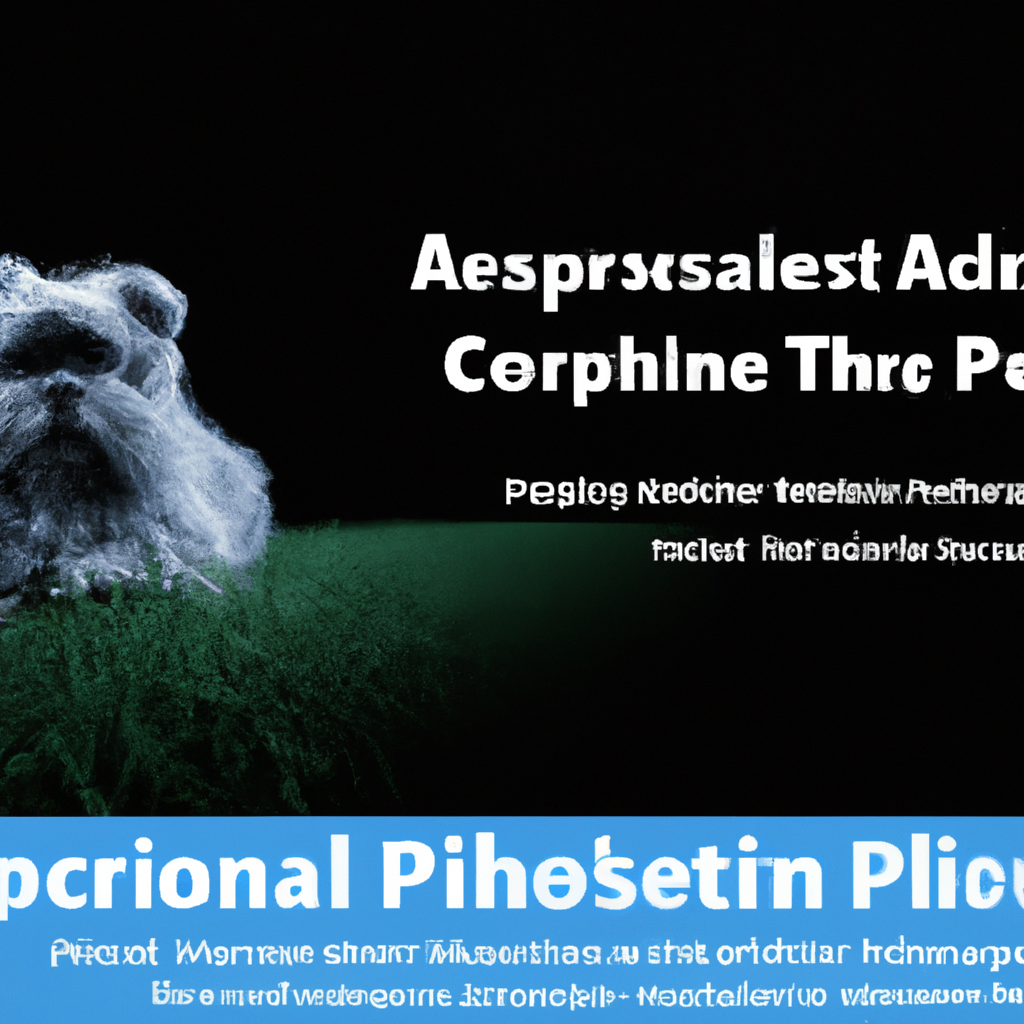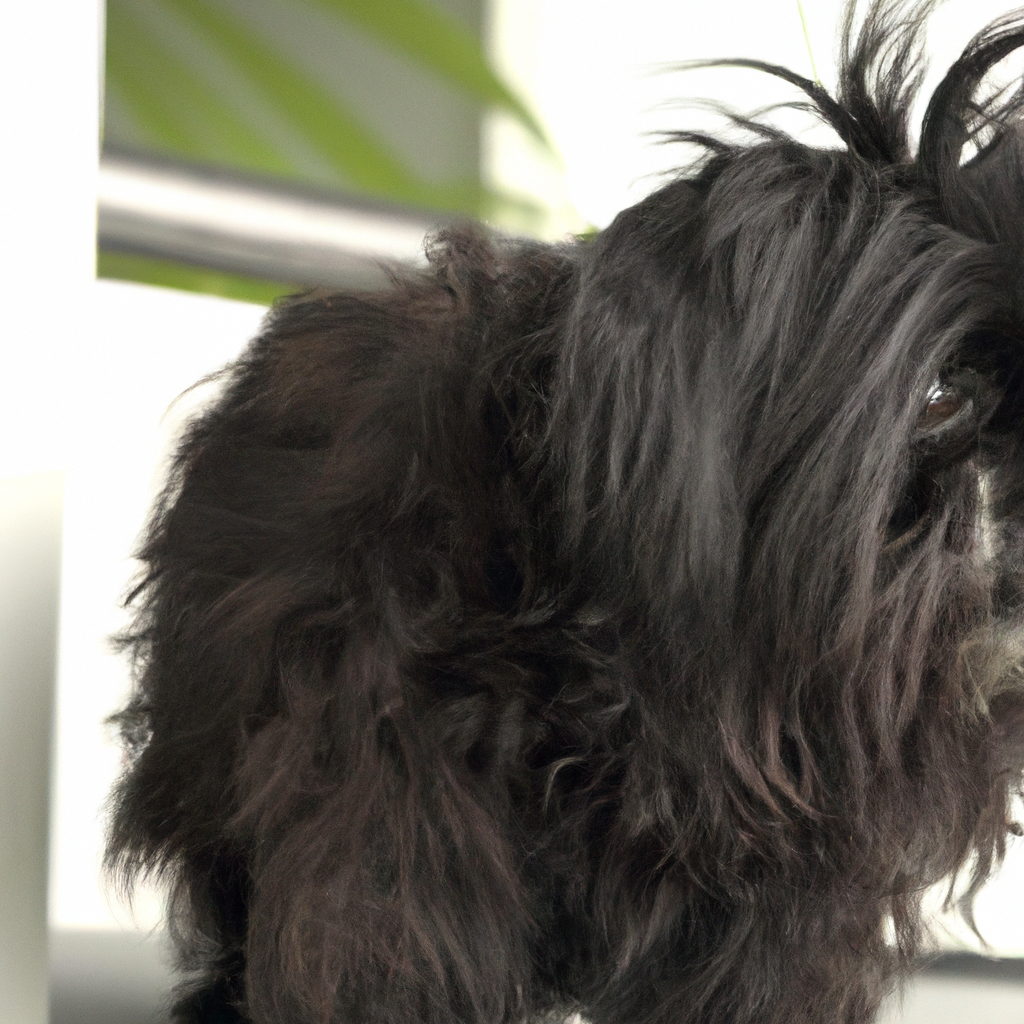The Affenpinscher, also known as the “Monkey Terrier”, is a small breed of dog that is known for its playful and adventurous nature. Despite their small size and generally robust health, Affenpinschers are prone to certain health concerns that potential owners should be aware of. These health issues range from genetic disorders to conditions that develop over time due to their physical characteristics. This introduction will delve into the various health concerns of Affenpinschers, providing a comprehensive understanding of potential risks and preventative measures associated with this unique breed.
Understanding the Genetic Health Issues in Affenpinschers
Affenpinschers, affectionately known as “Monkey Dogs” due to their distinct primate-like appearance, are a small but sturdy breed known for their playful and adventurous spirit. However, like all breeds, Affenpinschers are prone to certain genetic health issues that potential owners should be aware of. Understanding these health concerns can help you provide the best possible care for your Affenpinscher, ensuring they live a long, happy, and healthy life.
Firstly, let’s delve into the issue of hip dysplasia, a common genetic disorder in many dog breeds, including Affenpinschers. This condition occurs when the hip joint doesn’t develop properly, leading to arthritis or even lameness in severe cases. While it’s a hereditary condition, factors like diet, exercise, and weight can also influence its onset. Regular vet check-ups and maintaining a healthy lifestyle can help manage this condition and keep your Affenpinscher active and comfortable.
Next on the list is a condition called patellar luxation, or slipped stifles, which is particularly common in small dog breeds. This condition occurs when the dog’s kneecap is dislocated from its normal position, causing discomfort and affecting the dog’s ability to walk. While it’s often a congenital issue, it can also be caused by trauma. Regular exercise and maintaining a healthy weight can help prevent this condition, but in severe cases, surgery may be required.
Affenpinschers are also prone to certain eye conditions, such as cataracts and progressive retinal atrophy (PRA). Cataracts can cause cloudiness in the eye lens, leading to impaired vision, while PRA is a degenerative eye disorder that can eventually lead to blindness. Regular eye check-ups can help detect these conditions early, and treatments can range from medication to surgery, depending on the severity.
Heart disease is another concern in Affenpinschers, with the breed being predisposed to conditions like heart murmurs and patent ductus arteriosus (PDA). These conditions can lead to heart failure if left untreated, so it’s crucial to have regular vet check-ups to monitor your dog’s heart health. Treatment can range from medication to manage symptoms to surgery in more severe cases.
Lastly, let’s touch on a condition called Legg-Calve-Perthes Disease, a disorder that affects the hip joint. This condition causes a decrease in blood supply to the head of the femur, leading to lameness and joint inflammation. It’s typically seen in young Affenpinschers and can be managed with surgery and physical therapy.
While these health concerns may seem daunting, it’s important to remember that not all Affenpinschers will develop these conditions. Regular vet check-ups, a balanced diet, and plenty of exercises can go a long way in keeping your Affenpinscher healthy. Additionally, if you’re considering getting an Affenpinscher from a breeder, ensure they have health clearances for the puppy’s parents to reduce the risk of genetic conditions.
In conclusion, while Affenpinschers are prone to certain genetic health issues, understanding these conditions and knowing how to manage them can ensure your furry friend leads a happy and healthy life. After all, every dog deserves the best care possible, and being informed is the first step towards providing that care.
Affenpinschers and Heart Disease: What You Need to Know
Affenpinschers, affectionately known as “Monkey Dogs,” are small, playful, and energetic dogs that are loved by many for their unique appearance and charming personalities. However, like any breed, Affenpinschers are prone to certain health concerns, one of which is heart disease. Understanding the risks, symptoms, and preventative measures associated with heart disease in Affenpinschers is crucial for any owner who wants to ensure their furry friend lives a long, healthy life.
Heart disease in Affenpinschers, as in humans, refers to a range of conditions that affect the heart. The most common type of heart disease in this breed is mitral valve disease, a condition where the heart’s mitral valve deteriorates. This can lead to congestive heart failure, a serious condition that requires immediate veterinary attention.
Now, you might be wondering, how can you tell if your Affenpinscher is at risk? Well, while heart disease can affect any dog, certain factors increase the likelihood. Age is a significant factor; older Affenpinschers are more likely to develop heart disease than their younger counterparts. Additionally, overweight dogs are at a higher risk, as excess weight puts additional strain on the heart.
Recognizing the symptoms of heart disease in your Affenpinscher is the first step towards getting them the help they need. Symptoms can include coughing, difficulty breathing, fatigue, loss of appetite, and weight loss. If you notice any of these signs, it’s important to consult with your vet immediately. Remember, early detection is key when it comes to managing heart disease.
So, what can you do to prevent heart disease in your Affenpinscher? A healthy diet and regular exercise are crucial. Feeding your dog a balanced diet can help maintain a healthy weight, reducing the risk of heart disease. Regular exercise, such as daily walks or play sessions, can also help keep your Affenpinscher’s heart healthy.
Regular check-ups with your vet are also essential. Your vet can monitor your dog’s heart health and catch any potential issues early. They can also provide advice tailored to your Affenpinscher’s specific needs and lifestyle.
Another preventative measure is genetic testing. Some Affenpinschers may be genetically predisposed to heart disease. Genetic testing can help identify this risk early on, allowing you to take steps to manage it.
While the thought of your Affenpinscher developing heart disease can be scary, remember that it’s not a guaranteed fate. Many dogs with heart disease live long, happy lives with the right management and care. The key is to stay informed, be vigilant for symptoms, and maintain regular vet check-ups.
In conclusion, while Affenpinschers are prone to heart disease, there are many steps owners can take to reduce the risk and manage the condition if it does develop. By understanding the risks and symptoms, maintaining a healthy lifestyle for your dog, and keeping up with regular vet visits, you can help ensure your Affenpinscher lives a long, healthy, and happy life. After all, our furry friends rely on us to look after their health, and as responsible pet owners, it’s a duty we should take seriously.
Eye Problems in Affenpinschers: An In-depth Analysis
Affenpinschers, affectionately known as “Monkey Dogs,” are a small breed of dog that originated in Germany. These dogs are known for their playful and adventurous nature, but like any breed, they are prone to certain health issues. One of the most common health concerns for Affenpinschers is eye problems. This article will delve into the various eye problems that Affenpinschers may encounter, providing an in-depth analysis of each.
Firstly, let’s talk about cataracts. Cataracts are a common eye problem in Affenpinschers, and they can lead to blindness if left untreated. They occur when the lens of the eye becomes cloudy, preventing light from reaching the retina. This can cause blurred vision and eventually lead to total vision loss. Cataracts can be caused by a variety of factors, including age, diabetes, and trauma to the eye. Fortunately, cataracts can be treated with surgery, which involves removing the cloudy lens and replacing it with an artificial one.
Next on the list is Progressive Retinal Atrophy (PRA). PRA is a group of genetic diseases that cause the retina to deteriorate over time, leading to blindness. This condition is particularly concerning because it is progressive, meaning it gets worse over time. Affenpinschers with PRA may initially experience night blindness, which can then progress to complete blindness. Unfortunately, there is currently no cure for PRA, but early detection can help manage the condition and slow its progression.
Glaucoma is another eye condition that Affenpinschers are prone to. This condition occurs when there is an increase in pressure within the eye, which can damage the optic nerve and lead to vision loss. Glaucoma can be quite painful for dogs and can cause symptoms such as redness, tearing, and a visible third eyelid. Treatment for glaucoma typically involves medication to reduce the pressure in the eye, and in severe cases, surgery may be required.
Corneal dystrophy is a less common but still significant eye problem in Affenpinschers. This condition affects the cornea, the clear outer layer of the eye, causing it to become cloudy or opaque. Corneal dystrophy can affect one or both eyes and can lead to vision loss. Treatment typically involves managing the symptoms and preventing further damage to the cornea.
Lastly, let’s discuss Distichiasis. This condition occurs when an extra row of eyelashes grows on the inner edge of the eyelid, causing irritation to the eye. Symptoms of Distichiasis include excessive blinking, tearing, and redness. Treatment usually involves removing the extra eyelashes to prevent further irritation.
In conclusion, while Affenpinschers are a generally healthy breed, they are prone to a number of eye conditions. Regular check-ups with a veterinarian are crucial to catch any potential issues early and begin treatment. Additionally, if you’re considering adding an Affenpinscher to your family, it’s important to choose a reputable breeder who tests their breeding dogs for these and other genetic conditions. By being proactive and informed, you can help ensure your Affenpinscher lives a long, healthy, and happy life.
Hip Dysplasia in Affenpinschers: Causes and Prevention

Affenpinschers, affectionately known as “Monkey Dogs,” are small, playful, and energetic dogs that are loved by many for their unique appearance and lively personality. However, like any breed, they are not without their health concerns. One of the most common health issues that Affenpinschers face is hip dysplasia. Understanding the causes and prevention of this condition can help you ensure your furry friend lives a long, healthy, and happy life.
Hip dysplasia is a genetic condition that affects the hip joint of dogs. It occurs when the ball and socket of the hip joint do not fit together properly, causing the joint to wear down over time. This can lead to pain, inflammation, and eventually, arthritis. While it can affect any breed, it is more common in larger dogs. However, Affenpinschers are also at risk due to their genetic predisposition.
The exact cause of hip dysplasia in Affenpinschers is not entirely understood, but it is believed to be a combination of genetics and environmental factors. The condition is hereditary, meaning it can be passed down from parent to offspring. If one or both parents have hip dysplasia, the chances of their puppies developing the condition are significantly increased.
Environmental factors also play a role in the development of hip dysplasia. Factors such as rapid weight gain, improper diet, and lack of exercise can all contribute to the onset of this condition. For instance, a diet high in calories can lead to rapid weight gain, which puts extra stress on the joints. Similarly, lack of exercise can lead to weak muscles, which can also contribute to joint problems.
Preventing hip dysplasia in Affenpinschers involves a combination of responsible breeding and proper care. If you’re considering adding an Affenpinscher to your family, it’s important to choose a reputable breeder who tests their breeding dogs for hip dysplasia. This can significantly reduce the risk of your puppy developing the condition.
Proper care and management are also crucial in preventing hip dysplasia. A balanced diet that promotes slow and steady growth can help prevent rapid weight gain, which can put extra stress on the joints. Regular exercise is also important to keep your Affenpinscher’s muscles strong and healthy. However, it’s important to note that not all exercises are suitable for this breed. High-impact activities such as jumping or running on hard surfaces can put extra stress on the joints and should be avoided.
Regular vet check-ups are also essential in preventing and managing hip dysplasia. Your vet can monitor your Affenpinscher’s growth and development and provide advice on diet and exercise. They can also detect early signs of hip dysplasia and provide treatment to slow down the progression of the condition.
In conclusion, while hip dysplasia is a common health concern in Affenpinschers, it can be managed and even prevented with the right care and attention. By understanding the causes and taking steps to prevent it, you can help ensure your Affenpinscher lives a long, healthy, and happy life. After all, our furry friends deserve nothing but the best.
Patellar Luxation in Affenpinschers: A Comprehensive Guide
Affenpinschers, affectionately known as “Monkey Dogs,” are small, sturdy dogs known for their playful and adventurous spirit. However, like all breeds, they are prone to certain health conditions. One such condition that is particularly common among Affenpinschers is Patellar Luxation. This article aims to provide a comprehensive guide to understanding this health concern, its symptoms, causes, and treatment options.
Patellar Luxation, in simple terms, is a condition where the dog’s kneecap (patella) dislocates or moves out of its normal position. It’s akin to a human knee dislocation and can be quite painful for the dog. This condition is prevalent in small dog breeds, including Affenpinschers.
The symptoms of Patellar Luxation can vary depending on the severity of the condition. In mild cases, your Affenpinscher might exhibit a slight limp or an unusual gait, often described as a ‘skip’ in their step. They might also occasionally hold up the affected leg. In more severe cases, the dog may show signs of discomfort or pain, reluctance to jump or run, and in some instances, they may not be able to move the affected leg at all.
The causes of Patellar Luxation in Affenpinschers are typically genetic. It’s a congenital condition, meaning it’s present at birth, although the symptoms might not become apparent until later in the dog’s life. Trauma can also cause Patellar Luxation, but this is less common.
If you suspect your Affenpinscher is suffering from Patellar Luxation, it’s crucial to seek veterinary attention promptly. Your vet will likely perform a physical examination and may use X-rays or other imaging techniques to confirm the diagnosis.
Once diagnosed, the treatment for Patellar Luxation depends on the severity of the condition. In mild cases, your vet might recommend pain management and physical therapy to strengthen the muscles around the knee. Non-surgical treatments can be effective in managing the condition and improving the dog’s quality of life.
However, in more severe cases, surgery might be necessary. The surgical procedure typically involves realigning the kneecap and deepening the groove in which it sits to prevent future dislocations. Post-surgery, your Affenpinscher will likely need physical therapy and a period of rest to recover fully.
While Patellar Luxation can be a concerning health issue for Affenpinscher owners, it’s important to remember that with early detection and appropriate treatment, dogs can lead a happy and active life. Regular vet check-ups are crucial in catching any potential issues early.
Moreover, if you’re considering adding an Affenpinscher to your family, it’s advisable to choose a reputable breeder who screens for health conditions like Patellar Luxation. This proactive approach can help ensure that you’re bringing home a healthy puppy, reducing the likelihood of facing this condition down the line.
In conclusion, while Patellar Luxation is a common health concern in Affenpinschers, it’s manageable with the right care and attention. By understanding the symptoms and causes, seeking prompt veterinary attention, and following the recommended treatment plan, you can help your Affenpinscher navigate this condition and enjoy a fulfilling, active life.
Dental Health Concerns in Affenpinschers: Prevention and Treatment
Affenpinschers, affectionately known as “Monkey Dogs,” are small, playful, and intelligent dogs that are loved by many. However, like any breed, they have their own set of health concerns. One of the most common issues that Affenpinschers face is dental health problems. Understanding these issues, their prevention, and treatment can help you ensure your furry friend stays healthy and happy.
Affenpinschers are prone to dental diseases due to their small size and the structure of their mouths. Their teeth are often crowded together, making it difficult to maintain proper oral hygiene. This can lead to plaque buildup, which if left untreated, can progress to periodontal disease. Periodontal disease is a serious condition that can lead to tooth loss and even affect the dog’s heart, liver, and kidneys.
Preventing dental diseases in Affenpinschers starts with regular dental care. Brushing your dog’s teeth daily is the gold standard for maintaining oral health. It might be a bit challenging at first, especially if your Affenpinscher is not used to it, but with patience and consistency, it can become a part of your daily routine. Using dog-friendly toothpaste and a soft-bristled toothbrush can make the process easier and more comfortable for your pet.
In addition to brushing, providing your Affenpinscher with dental chews can also help in maintaining oral health. Dental chews are designed to clean the teeth as the dog chews on them, helping to remove plaque and tartar. However, they should not replace brushing but should be used as a supplement to it.
Regular veterinary check-ups are also crucial in preventing dental diseases. Your vet can perform a thorough dental examination and professional cleaning, which can help detect and treat any issues early on. It’s recommended to have your Affenpinscher’s teeth professionally cleaned at least once a year.
If your Affenpinscher is diagnosed with a dental disease, it’s important to follow your vet’s treatment plan closely. This may include professional cleaning, antibiotics, or in severe cases, tooth extraction. Remember, dental diseases can be painful for your pet, so early detection and treatment are key to ensuring their comfort and health.
Diet also plays a significant role in your Affenpinscher’s dental health. Feeding your dog a balanced diet that’s appropriate for their age, size, and health status can help maintain their overall health, including their dental health. Some vets recommend feeding dry kibble, as it can help clean the teeth as the dog chews. However, it’s important to consult with your vet to determine the best diet for your pet.
In conclusion, dental health concerns in Affenpinschers are common but can be prevented and treated with proper care. Regular brushing, dental chews, veterinary check-ups, a balanced diet, and prompt treatment of dental diseases can help keep your Affenpinscher’s teeth healthy. Remember, your pet’s dental health is an important part of their overall well-being, so it’s worth investing time and effort into maintaining it. After all, a healthy Affenpinscher is a happy Affenpinscher.
Skin Allergies in Affenpinschers: Symptoms and Solutions
Affenpinschers, affectionately known as “Monkey Dogs,” are small, charming, and energetic dogs that are loved by many for their unique appearance and playful nature. However, like any other breed, Affenpinschers are prone to certain health issues, one of which is skin allergies. Understanding the symptoms and solutions for these skin allergies can help you ensure your Affenpinscher lives a comfortable and healthy life.
Skin allergies in Affenpinschers can manifest in various ways. The most common symptoms include excessive scratching, biting, and licking, particularly around the paws, belly, and ears. You may also notice redness, inflammation, and even hair loss in certain areas. In more severe cases, Affenpinschers may develop hot spots, which are areas of skin that become infected and inflamed due to constant scratching or licking.
These symptoms can be distressing for both the dog and the owner. However, it’s important to remember that they are the body’s way of signaling that something is not right. Therefore, if you notice any of these signs, it’s crucial to consult with a veterinarian as soon as possible.
The causes of skin allergies in Affenpinschers can be numerous. They can be allergic to certain foods, environmental factors like pollen or dust mites, or even fleas. Identifying the exact cause can be a bit of a detective game, but it’s a crucial step in managing the condition. Your vet may suggest an elimination diet to rule out food allergies or conduct allergy testing to identify environmental triggers.
Once the cause is identified, the next step is to manage the allergy. If it’s a food allergy, your vet will recommend a diet change. For environmental allergies, you may need to make changes in your home, like using hypoallergenic bedding or air purifiers. Flea allergies can be managed with regular flea treatments.
In addition to these measures, your vet may prescribe medications to control the symptoms. These can include antihistamines, corticosteroids, or topical creams to soothe the skin. In some cases, immunotherapy, which involves exposing the dog to small amounts of the allergen to build up tolerance, may be recommended.
While dealing with skin allergies can be challenging, it’s important to remember that with the right care and management, your Affenpinscher can lead a happy and comfortable life. Regular check-ups with the vet, a balanced diet, and a clean environment can go a long way in preventing and managing skin allergies.
In conclusion, skin allergies in Affenpinschers, while common, are manageable. By being aware of the symptoms and potential causes, you can take proactive steps to ensure your furry friend’s health and comfort. Remember, early detection and intervention are key. So, if you notice your Affenpinscher showing signs of a skin allergy, don’t hesitate to seek veterinary advice. After all, our pets rely on us to keep them healthy, and understanding their health concerns is a big part of that responsibility.
The Impact of Obesity on the Health of Affenpinschers
Affenpinschers, often referred to as “Monkey Terriers” due to their distinct primate-like appearance, are small but sturdy dogs known for their playful and adventurous nature. However, like any other breed, Affenpinschers are susceptible to certain health issues, one of the most prevalent being obesity. The impact of obesity on the health of Affenpinschers is significant and can lead to a variety of complications if not addressed promptly.
Obesity in Affenpinschers, as in humans, is typically the result of an imbalance between calorie intake and energy expenditure. This breed is known for its love of food, and without proper portion control and regular exercise, they can easily become overweight. The problem is further exacerbated by the fact that many owners find it difficult to resist their Affenpinscher’s pleading eyes and end up overfeeding them, leading to weight gain.
The consequences of obesity in Affenpinschers are far-reaching and can significantly impact their quality of life. One of the most immediate effects is a decrease in mobility. Affenpinschers are naturally active and agile dogs, but excess weight can put undue stress on their joints, leading to pain and difficulty moving. This can be particularly problematic for this breed, as their small size already puts them at risk for joint issues.
In addition to mobility problems, obesity can also lead to a host of other health issues in Affenpinschers. Overweight dogs are at a higher risk for developing heart disease, diabetes, and certain types of cancer. Furthermore, the extra weight can put pressure on the dog’s organs, leading to problems with the liver and kidneys. In severe cases, obesity can even shorten an Affenpinscher’s lifespan.
The good news is that obesity in Affenpinschers is preventable and, in most cases, reversible. The first step in combating obesity is to ensure your dog is getting a balanced diet. This means feeding them high-quality dog food in appropriate portions and limiting treats and table scraps. It’s also important to provide your Affenpinscher with plenty of opportunities for physical activity. Regular walks, playtime in the yard, and even indoor games can help keep your dog active and healthy.
In some cases, underlying health issues may contribute to weight gain in Affenpinschers. Conditions such as hypothyroidism can slow down the dog’s metabolism, making it easier for them to gain weight. If you’re struggling to keep your Affenpinscher’s weight under control, it’s worth consulting with a vet to rule out any potential health problems.
In conclusion, while Affenpinschers are a generally healthy breed, they are not immune to the health risks associated with obesity. As a responsible pet owner, it’s important to be aware of these risks and take steps to prevent your dog from becoming overweight. By providing a balanced diet, regular exercise, and regular vet check-ups, you can help ensure your Affenpinscher lives a long, healthy, and happy life.In conclusion, Affenpinschers, like any other breed, have specific health concerns that potential owners should be aware of. These include hip dysplasia, heart defects, respiratory issues, vision problems, and skin disorders. Regular veterinary check-ups, a balanced diet, and proper exercise can help manage these health issues and ensure the dog’s overall well-being. However, it’s important to remember that not all Affenpinschers will develop these conditions, but awareness can lead to early detection and treatment.





